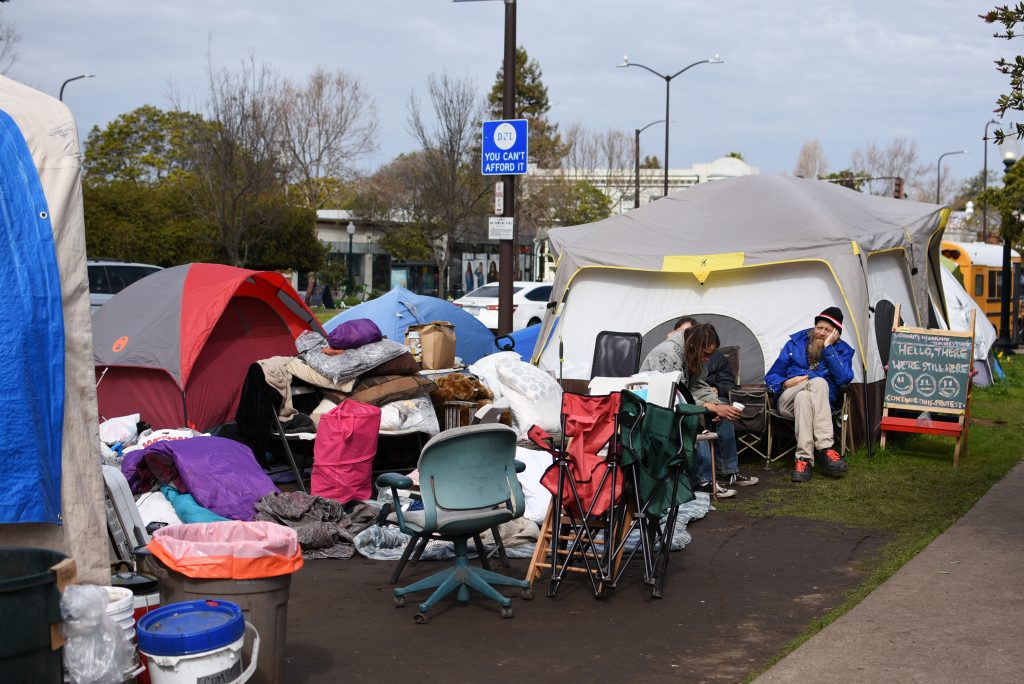Whether you’re walking through downtown, passing People’s Park, or riding BART, you see the effects of rising housing costs and the many other factors that contribute to the staggering rates of homelessness in our city. Although Berkeley has a reputation of being a liberal bubble, we are not always quick to recognize or address the problems that arise within our bubble. Our values are clashing with the economic realities of our city, and perpetuating high rates of homelessness.
There is also the misconception that homeless people flock to the East Bay because of our resources. In reality, according to a survey by the National Alliance to End Homelessness, 70 percent of homeless people in Alameda County were previously housed there. The rapid inflation in rent and housing prices means that as of January 2019, according to Rent Jungle, the average rent for an apartment in Berkeley is over $3,000.
Although there may not be an end to homelessness in sight, there is action being taken to get legislation passed, services offered, and affordable housing built. As our city faces this massive problem, it is important to highlight the hard work and innovative methods of organizations supporting Berkeley’s homeless individuals.
BOSS:
The organization Building Opportunities for Self-Sufficiency (BOSS) has been working tirelessly for 45 years to not only provide a place for homeless people to stay temporarily, but to provide training and opportunities for them to get back on their feet. One of the problems with our system is that often the resources available for homeless individuals are emergency services that will send them back to the streets within 24 hours. Even shelters are only a solution for the night, and leave homeless people with no more skills or chances to get out of their situation.
BOSS works to help the homeless and severely mentally ill individuals in numerous ways. They provide shelters, transitional housing, employment services, adult education classes, drugs and alcohol recovery services, after school programs for homeless children, and leadership development programs. They work especially with individuals who have been impacted by the criminal justice system, for whom re-entry to society is difficult.
The Suitcase Clinic:
Since 1989, University of California Berkeley’s Suitcase Clinic has been servicing a wide range of homeless, uninsured, and low-income individuals. Through their General Clinic, Women’s Clinic, and Youth/LGBTQ+ Clinic, the organization strives to provide necessary services and empower individuals with the help of students and professional volunteers. The organization is entirely student-run, from the organization to the management. Their goal is to use their unique perspective as students to help their community and inspire an important dialogue regarding the issue of homelessness. The Suitcase Clinic provides many weekly services, including haircutting and foot washing. With the help of trained volunteers and outside partners, they can also offer medical, psychiatric, and chiropractic help. Their Youth/LGBTQ+ Clinic even provides free HIV testing and counseling. These unconventional methods of supporting homeless individuals are what makes The Suitcase Clinic’s work so incredible. In a time of slow-moving legislation and unresponsive government, it’s young people like these students that need to do what they can to help with the homelessness crisis in their community.
YEAH!:
Youth Engagement Advocacy Housing (YEAH!) is an emergency shelter program in Berkeley which provides necessities primarily for youth. It acts as a haven away from the stress of living on the street, and fosters a community or friendship and support. The YEAH! shelter provides hot meals, mats to sleep on, showers, and even fresh socks and underwear. For seven nights a week, all year, it is staffed by two trained supervisors and a team of dedicated volunteers.
One of the things that makes this service special is the on-site therapy and medical referrals they offer. Because of their partnerships with Berkeley Mental Health and The Suitcase Clinic, YEAH! can connect youth with resources that they might not have been able to find on their own, especially without access to the internet. By helping youth meet with trained clinicians, set goals, and chart life plans, YEAH! is helping homeless youth not let their difficult childhood set a precedent for what the rest of their life can be.
Women’s Daytime Drop-In Center:
To any homeless woman and her children, the Women’s Daytime Drop-In Center (WDDC) is a safe place. Located on Acton Street, these homeless individuals can find warm meals and counseling. During the day, when shelters are closed, this service is necessary to support Berkeley’s homeless women and children.
By offering weekly domestic violence support groups, the WDDC cares for the 63 percent of the homeless population who are victims of domestic violence, according to the National Alliance to End Homelessness. The WDDC also provides parenting support and helps individuals navigate the complex system to apply for housing. They are most recently taking part in a project to build a complex of tiny homes in undeveloped West Berkeley.
These are just a few of the many organizations and people dedicating their careers, if not lives, to helping the homeless citizens of Berkeley. These efforts show that change doesn’t have to begin at the top. As we work towards better rent control laws and more affordable housing, we can still find ways to help with homeless people’s daily struggles.


